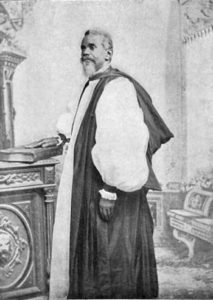
James Theodore Holly
*The birth of James Theodore Holly in 1829 is marked on this date. He was a Black minister and abolitionist.
From Detroit, Michigan, his father, James Overton Holly, was a white-American Scottish man, and records show that his mother's name was Jane. Holly was baptized and raised a Catholic yet gradually he moved away from the Catholic values. He spent his early years in Washington, D. C., and Brooklyn, NY, where he connected with Frederick Douglass and other Black abolitionists. Holly's emphasis on native Black clergy was in distinct opposition to Catholic emphasis on white European clergy.
In 1852 he converted to the Episcopal Church and went to Haiti in 1855. There in 1874, he became the first Black Episcopal Bishop and the second Bishop of any major white Christian church. During this time, Haiti was split with the Vatican, and most men of Haiti supported their religious sentiment through the symbolism and observance of the Masonic Lodge. As an experienced Masonic leader and scholar, Holly visited the Masonic temples and made friends among their exclusive members. He was also willing to perform Masonic burial services.
He also enjoyed reminding the Mulattoes that only three public organizations in Haiti had self-ruling native administrations: the Government, the Masonic fraternity, and the Orthodox Apostolic Church. In July 1863, Holly organized the Holy Trinity Church. He later spent 15 years in Washington D. C. and moved to Brooklyn, where he became friends with Frederick Douglass. From 1889 to 1891, Holly aided Douglass in several of his programs.
James Theodore Holly died on March 13, 1911.
An Encyclopedia of African American Christian Heritage
by Marvin Andrew McMickle
Judson Press, Copyright 2002
ISBN 0-817014-02-0